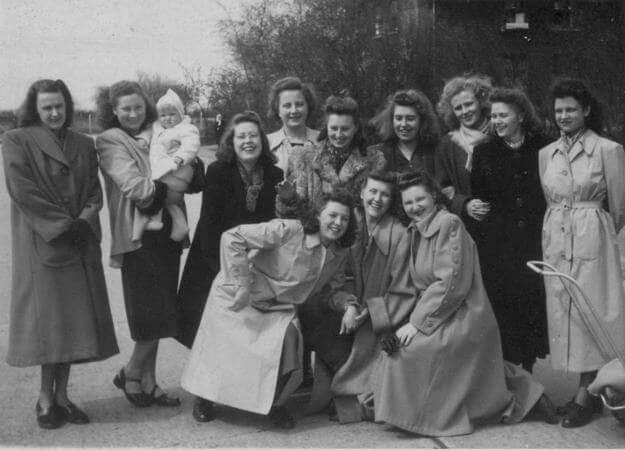Helga Merits

Girls at the Baltic University. Archive photo by Helga Merits
Toilet paper seemed to have been the most sought after item to have in a time of a lock-down.
People were buying it in large quantities, afraid that they would not have enough while stuck at home for several weeks.
Strangely enough, there was no run on diapers or sanitary pads, unless I have missed it.
But it did make me wonder who the people were who actually bought all that toilet paper.
Personal hygiene is still a subject not much discussed.
When I started to interview refugees from the Baltic countries there was only one woman, Aino, who told me what it meant to have her period, while fleeing her country.
Aino fled Estonia together with her two sisters.
Her family lived in Valga, in the south of Estonia.
Her eldest sister could hardly walk; she probably had had polio in her youth.
Therefore Aino and her sisters left by car for the harbour of Pärnu, to find a boat.
Their parents would come later by horse and cart, taking household items with them, so they could trade these for money.
Aino and her sisters waited for their parents in Pärnu, but they didn’t come.
Meanwhile the Soviet army was approaching.
The girls had not taken anything with them, except for a small purse with some money, but decided to flee nonetheless.
It turned out all boats were full and they were too late. A Red Cross train to Latvia was the only remaining option.
Upon arrival in Latvia, Aino discovered her period had begun.
She had not taken any sanitary pads with her. She felt so dirty. As the train had stopped, probably for hours, she decided to leave the train together with her sister, to search for a toilet, hoping to find some paper or something else to clean herself with, leaving her purse in the train with her invalid sister.
But then all of a sudden the train departed, taking her sister away, who would not be able to manage on her own.
Aino and her sister were devastated.
They had lost their sister, they could not go back home and didn’t know how to go further.
They found a train which went in the same direction as the train her sister was still on: to Riga; though they had to walk the last stretch.
Aino had tried to clean herself, but had found it impossible to do so satisfactorily, as they had to go on.
She told me again and again how incredibly dirty she had felt.
Still, the most important thing was to find her sister.
In Riga they could not find the right train and they walked in one direction and then in the other, across the Daugava river and back again.
Aino was desperate, tired and filthy. But they found each other in the end and were reunited.
Aino’s periods did not return due to the stress, lack of food and hard labour in the factory in Germany, where she was obliged to work.
When the war ended and the food was somewhat better, the periods resumed.
There remained a shortage of sanitary pads in refugee camps; they had to improvise.
Some things don’t change: when the camps for Syrian refugees were set up, there was a huge shortage of sanitary pads, which made the situation for women more difficult.
For too many girls around the world, sometimes the shortage, but most of the time the cost of sanitary pads are an ongoing problem, and they drop out of school because their parents can’t afford them.
In India, where many girls would get their sanitary pads at school, because of the corona crisis they no longer receive any, which makes the girls feel anxious and uncertain.
Periods don’t stop during the corona crisis, as these don’t stop while fleeing, or while living in a refugee camp.
Unfortunately, having a period is a subject not much talked about, as it is still too often related to shame, whereas the menstrual cycle should be something to celebrate, as none of us would be here had our mothers not had their monthly cycle.


















